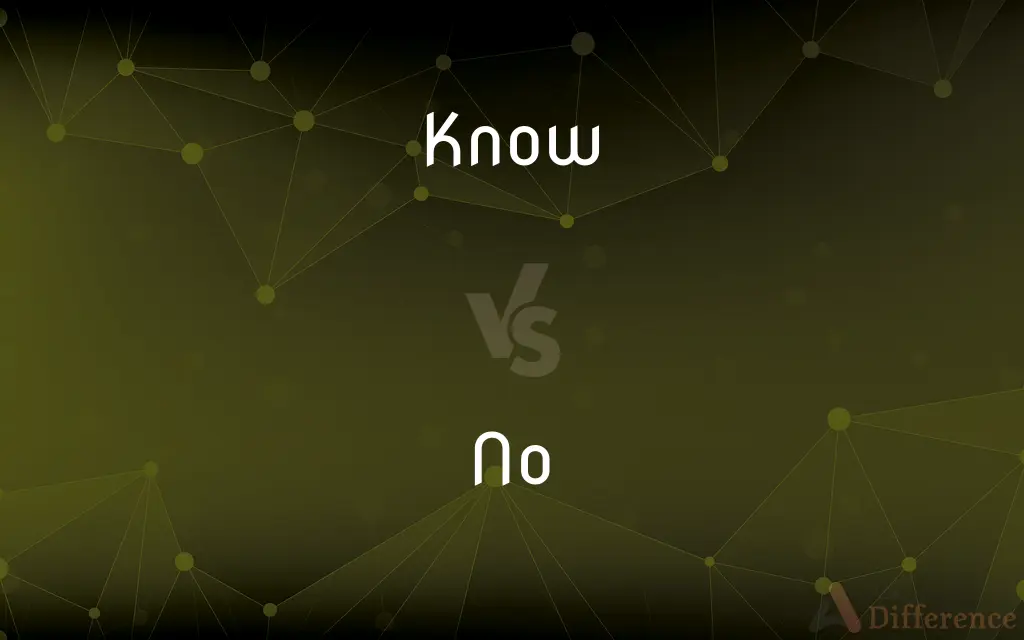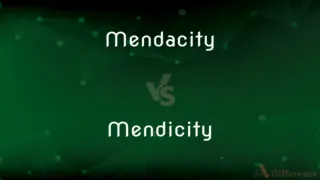Know vs. No — What's the Difference?
Edited by Tayyaba Rehman — By Fiza Rafique — Updated on October 24, 2023
Know means to be aware of or familiar with, while No is a negative response or denial.

Difference Between Know and No
Table of Contents
ADVERTISEMENT
Key Differences
Know and No, despite their phonetic similarity, differ both in meaning and usage. Know pertains to knowledge or awareness. If one claims to know a fact, they assert their familiarity or understanding of that fact. On the contrary, No is a straightforward term used to negate or decline something.
Additionally, Know operates primarily as a verb. For example, when someone says they know a language, they're describing their ability to speak or understand that language. In contrast, No serves primarily as an adjective, adverb, or noun. It can denote a negative reply, absence, or refusal, such as denying permission with a simple "no."
Grammatically, Know can be conjugated; it has different forms like knowing, known, and knows. On the other hand, No remains consistent and does not undergo any conjugation. Its meaning is universally recognized as indicating negation or absence.
Furthermore, Know can be utilized in various contexts, from personal knowledge to academic understanding. A person might know a friend, or they might know a mathematical concept. No, however, has a more limited scope. Its chief purpose is to express denial, refusal, or the absence of something.
In summary, Know revolves around knowledge and familiarity, and it can be molded grammatically to fit context. No, however, stands as a sentinel of refusal and negation, remaining unchanged and universally recognized.
ADVERTISEMENT
Comparison Chart
Basic Function
To have knowledge or awareness of something
To negate or decline something
Part of Speech
Primarily a verb
Adjective, adverb, or noun
Conjugation
Yes (knows, knowing, known)
No (remains consistent)
Contextual Usage
Personal knowledge to academic understanding
Expressing denial, refusal, absence
Relationship to Other Terms
Can relate to other verbs (e.g., understand)
Often paired with other negatives (e.g., neither, nor)
Compare with Definitions
Know
To have information or knowledge about something.
I know the answer to that question.
No
Used to emphasize or introduce a negative statement.
No one can solve that riddle.
Know
To understand or grasp mentally.
Do you know what I mean?
No
A vote against a proposition.
The nos have it.
Know
Be aware of through observation, inquiry, or information
I know what I'm doing
Most people know that CFCs can damage the ozone layer
No
Not any
There is no excuse
No two plants are alike
Know
Have developed a relationship with (someone) through meeting and spending time with them; be familiar or friendly with
He knew and respected Laura
No
Used to give a negative response
‘Is anything wrong?’ ‘No.’
Know
Have sexual intercourse with (someone).
No
Not at all; to no extent
They were no more able to perform the task than I was
Know
To perceive directly; grasp in the mind with clarity or certainty.
No
Not
I'll no be a minute
Know
To regard as true beyond doubt
I know she won't fail.
No
Variant spelling of Noh
Know
To have a practical understanding of, as through experience; be skilled in
Knows how to cook.
No
Variant of Noh.
Know
To have fixed in the mind
Knows her Latin verbs.
No
A negative response; a denial or refusal
The proposal produced only noes.
Know
To have experience of
“a black stubble that had known no razor” (William Faulkner).
No
A negative vote or voter.
Know
To perceive as familiar; recognize
I know that face.
No
Used to express refusal, denial, disbelief, emphasis, or disagreement
No, I'm not going. No, you're wrong.
Know
To be acquainted with
He doesn't know his neighbors.
No
Not at all; not by any degree. Often used with the comparative
No better.
No more.
Know
To be able to distinguish; recognize as distinct
Knows right from wrong.
No
Not
Whether or no.
Know
To discern the character or nature of
Knew him for a liar.
No
(Informal) Used to indicate agreement with a preceding statement, especially when followed by a stronger judgment supporting that statement
"The car is getting old." "No, I know. It must be 10 years old by now.".
Know
(Archaic) To have sexual intercourse with.
No
Used to express strong refusal, doubt, or disbelief.
Know
To possess knowledge, understanding, or information.
No
Not any; not one; not a
No cookies are left.
Know
To be cognizant or aware.
No
Not at all; not close to being
He is no child.
Know
(transitive) To perceive the truth or factuality of; to be certain of or that.
I know that I’m right and you’re wrong.
He knew something terrible was going to happen.
No
Hardly any
Got there in no time flat. See Usage Note at nor1.
Know
(transitive) To be aware of; to be cognizant of.
Did you know Michelle and Jack were getting divorced? ― Yes, I knew.
She knows where I live.
I knew he was upset, but I didn't understand why.
No
Not any.
No one
There is no water left.
No hot dogs were sold yesterday.
No phones were at the store.
No two people are the same..
There was no score at the end of the first period. (The score was 0-0.)
Know
(transitive) To be acquainted or familiar with; to have encountered.
I know your mother, but I’ve never met your father.
No
Hardly any.
We'll be finished in no time at all.
Fifty pounds for this is no money, really.
Know
(transitive) To experience.
Their relationship knew ups and downs.
No
Not any possibility or allowance of (doing something).
No smoking
There's no stopping her once she gets going.
Know
(transitive) To be able to distinguish, to discern, particularly by contrast or comparison; to recognize the nature of.}}
To know a person's face or figure
To know right from wrong
I wouldn't know one from the other.
No
Not (a); not properly, not really; not fully.
My mother's no fool.
Working nine to five every day is no life.
Know
(transitive) To recognize as the same (as someone or something previously encountered) after an absence or change.
No
(with following adjective) not, not at all
Know
To understand or have a grasp of through experience or study.
Let me do it. I know how it works.
She knows how to swim.
His mother tongue is Italian, but he also knows French and English.
She knows chemistry better than anybody else.
Know your enemy and know yourself.
No
More and less, and idiomatically before other comparatives.}}
It is a less physical kind of torture, but no less gruesome.
You’re no better than a common thief.
Look no further than one's nose
This is no different from what we've been doing all along.
Know
To have sexual relations with. This meaning normally specified in modern English as e.g. to ’know someone in the biblical sense’ or to ‘know biblically.’
No
(informal) Used idiomatically before certain other adjectives.
This thing is no good.
The teacher’s decision was no fair.
Know
(intransitive) To have knowledge; to have information, be informed.
It is vital that he not know.
She knew of our plan.
He knows about 19th century politics.
No
Not
I just want to find out whether she's coming or no.
Know
(intransitive) To be or become aware or cognizant.
Did you know Michelle and Jack were getting divorced? ― Yes, I knew.
No
(archaic) nodot=a
Know
To be acquainted (with another person).
No
Without
Know
(transitive) To be able to play or perform (a song or other piece of music).
Do you know "Blueberry Hill"?
No
Like
Know
(rare) Knowledge; the state of knowing.
No
Not, does not, do not, etc.
Know
Knowledge; the state of knowing; now confined to the fixed phrase ‘in the know’
No
A negating expression; an answer that shows disagreement, denial, refusal, or disapproval
Know
Knee.
No
A vote not in favor, or opposing a proposition
The workers voted on whether to strike, and there were thirty "yeses" and two "nos".
Know
To perceive or apprehend clearly and certainly; to understand; to have full information of; as, to know one's duty.
O, that a man might knowThe end of this day's business ere it come!
There is a certainty in the proposition, and we know it.
Know how sublime a thing it isTo suffer and be strong.
No
Not any; not one; none; as, yes, we have no bananas; - often used as a quantifier.
Let there be no strife . . . between me and thee.
That goodness is no name, and happiness no dream.
Know
To be convinced of the truth of; to be fully assured of; as, to know things from information.
No
Nay; not; not at all; not in any respect or degree; - a word expressing negation, denial, or refusal. Before or after another negative, no is emphatic.
We do no otherwise than we are willed.
I am perplx'd and doubtful whether or noI dare accept this your congratulation.
There is none righteous, no, not one.
No! Nay, Heaven forbid.
Know
To be acquainted with; to be no stranger to; to be more or less familiar with the person, character, etc., of; to possess experience of; as, to know an author; to know the rules of an organization.
He hath made him to be sin for us, who knew no sin.
Not to know me argues yourselves unknown.
No
A refusal by use of the word no; a denial.
Know
To recognize; to distinguish; to discern the character of; as, to know a person's face or figure.
Ye shall know them by their fruits.
And their eyes were opened, and they knew him.
To knowFaithful friend from flattering foe.
At nearer view he thought he knew the dead.
No
A negative vote; one who votes in the negative; as, to call for the ayes and noes; the noes have it.
Know
To have sexual intercourse with.
And Adam knew Eve his wife.
And I knew that thou hearest me always.
The monk he instantly knew to be the prior.
In other hands I have known money do good.
No
A negative;
His no was loud and clear
Know
To have knowledge; to have a clear and certain perception; to possess wisdom, instruction, or information; - often with of.
Israel doth not know, my people doth not consider.
If any man will do his will, he shall know of the doctrine, whether it be of God, or whether I speak of myself.
The peasant folklore of Europe still knows of willows that bleed and weep and speak when hewn.
No
A radioactive transuranic element synthesized by bombarding curium with carbon ions; 7 isotopes are known
Know
To be assured; to feel confident.
No
Quantifier; used with either mass nouns or plural count nouns for indicating a complete or almost complete lack or zero quantity of;
We have no bananas
No eggs left and no money to buy any
Have you no decency?
Did it with no help
I'll get you there in no time
Have some milk
Some roses were still blooming
Having some friends over
Some apples
Some paper
Know
Be cognizant or aware of a fact or a specific piece of information; possess knowledge or information about;
I know that the President lied to the people
I want to know who is winning the game!
I know it's time
No
Referring to the degree to which a certain quality is present;
He was no heavier than a child
Know
Know how to do or perform something;
She knows how to knit
Does your husband know how to cook?
No
Not in any degree or manner; not at all;
He is no better today
Know
Be aware of the truth of something; have a belief or faith in something; regard as true beyond any doubt;
I know that I left the key on the table
Galileo knew that the earth moves around the sun
No
Used to express refusal or denial or disagreement etc or especially to emphasize a negative statement;
No, you are wrong
Know
Be familiar or acquainted with a person or an object;
She doesn't know this composer
Do you know my sister?
We know this movie
I know him under a different name
This flower is known as a Peruvian Lily
No
A negative response or refusal.
Will you be attending the party? No.
Know
Have firsthand knowledge of states, situations, emotions, or sensations;
I know the feeling!
Have you ever known hunger?
I have lived a kind of hell when I was a drug addict
The holocaust survivors have lived a nightmare
I lived through two divorces
No
Not any or not one.
There are no cookies left.
Know
Accept (someone) to be what is claimed or accept his power and authority;
The Crown Prince was acknowledged as the true heir to the throne
We do not recognize your gods
No
Expressing disagreement or contradiction.
You said it was blue, but no, it's green.
Know
Have fixed in the mind;
I know Latin
This student knows her irregular verbs
Do you know the poem well enough to recite it?
Know
Have sexual intercourse with;
This student sleeps with everyone in her dorm
Adam knew Eve
Were you ever intimate with this man?
Know
Know the nature or character of;
We all knew her as a big show-off
Know
Be able to distinguish, recognize as being different;
The child knows right from wrong
Know
Perceive as familiar;
I know this voice!
Know
To be acquainted or familiar with a person or thing.
She knows him from college.
Know
To recognize or identify.
I wouldn't know him if I saw him.
Know
To have experienced.
He knows hardship.
Common Curiosities
Can No be used as a noun?
Yes, as in "The nos outweighed the yeses in the vote."
Is knowing the present tense of Know?
No, "knowing" is the present participle; "know" is the present tense.
Does No always express negativity?
Primarily yes, it indicates negation, refusal, or absence.
Does No always negate?
In most contexts, yes. No is used to indicate a negative response.
Is Know only used to describe knowledge?
No, Know can also denote familiarity, recognition, understanding, or experience.
Does Know relate to cognition?
Yes, to know something often relates to cognitive understanding or awareness.
Is there a polite way to say No?
Yes, phrases like "I'm afraid not" or "unfortunately, no" are softer ways to decline.
What's the past tense of Know?
The past tense is "knew" and the past participle is "known."
What's the opposite of Know?
The opposite could be "ignore" or "be unaware of."
Is No synonymous with zero?
No, while "no" indicates absence or refusal, zero is a numerical value.
Can Know be used as a noun?
Rarely, but yes, as in "in the know," which means being informed.
Is "do you know" a common phrasing?
Yes, it's often used to ask if someone is aware of or familiar with something.
Can No mean none at all?
Yes, as in "no mistakes" meaning not a single mistake.
Can No be used to emphasize a statement?
Yes, as in "no way" or "no doubt."
Are Know and No homophones?
Yes, they sound similar but have different meanings and uses.
Share Your Discovery

Previous Comparison
Maths vs. Math
Next Comparison
Mendacity vs. MendicityAuthor Spotlight
Written by
Fiza RafiqueFiza Rafique is a skilled content writer at AskDifference.com, where she meticulously refines and enhances written pieces. Drawing from her vast editorial expertise, Fiza ensures clarity, accuracy, and precision in every article. Passionate about language, she continually seeks to elevate the quality of content for readers worldwide.
Edited by
Tayyaba RehmanTayyaba Rehman is a distinguished writer, currently serving as a primary contributor to askdifference.com. As a researcher in semantics and etymology, Tayyaba's passion for the complexity of languages and their distinctions has found a perfect home on the platform. Tayyaba delves into the intricacies of language, distinguishing between commonly confused words and phrases, thereby providing clarity for readers worldwide.















































